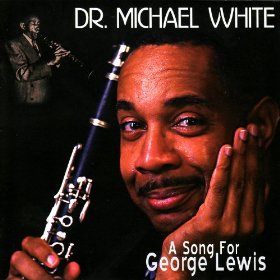This may be a tribute to George Lewis, and all but two of the 13 tracks are songs either written or recorded by the legendary New Orleans jazz clarinetist (who would have turned 100 on July 13), but White and his fellow traditionalists inject plenty of their own spirit into the proceedings—while remaining true to the instrumentation and structural principles of classic New Orleans jazz.
 White, an accomplished clarinetist himself, leads a great band of native musicians, with a mixture of established trad players of considerable pedigree, such as trumpeter Greg Stafford (a descendent of Henry “Red” Allen; leads Young Tuxedo Brass Band), trombonist Lucien Barbarin (of the famous Babarin family; plays in Harry Connick’s big band), and the great drummer Shannon Powell (original member of Danny Barker’s Fairview Brass Band; currently tours with Diana Krall); along with some younger faces, like trumpeter Mark Braud and bassist Kerry Lewis. The lineup reflects the multi-generational nature of classic jazz which has kept this tradition alive for a century.
White, an accomplished clarinetist himself, leads a great band of native musicians, with a mixture of established trad players of considerable pedigree, such as trumpeter Greg Stafford (a descendent of Henry “Red” Allen; leads Young Tuxedo Brass Band), trombonist Lucien Barbarin (of the famous Babarin family; plays in Harry Connick’s big band), and the great drummer Shannon Powell (original member of Danny Barker’s Fairview Brass Band; currently tours with Diana Krall); along with some younger faces, like trumpeter Mark Braud and bassist Kerry Lewis. The lineup reflects the multi-generational nature of classic jazz which has kept this tradition alive for a century.
They tackle White’s arrangements of an interesting assortment of songs. There are novelties like “Big Chief Battle Axe” and “Indian Sagua,” which derive rhythms from a characterization of Native American “war dance” music, and “Bugle Boy March,” derived from military marches. There are also old fashioned blues such as “Burgundy Street Blues,” hot swingers like “St. Phillip Street Breakdown,” and serene hymns like “Just a Closer Walk With Thee” and “What a Friend We Have in Jesus.” A definite highlight is “Louisiana-i-a,” with infectious, gravelly vocals by Stafford and a grand, “take it home” finish where all the players jam together polyphonically—the most exhilarating aspect of trad jazz.
Throughout, White leads on clarinet with dignified poise and a sweet stately tone, yet his playing also evokes sincere passion and exuberance, as though he were having an animated conversation with his fellow musicians. His original compositions, “Stafford Strut” and the title track, are especially suggestive of these features. Powell is also exceptional on drums, knowing instinctively just when to emphasize the bass drum or snare and when to tickle the kit with idiomatic “click-clack-clickity-clack” effects.
Ultimately, it’s the lively solos and swinging, tightly woven ensemble work that give this record a freshness above and beyond its historical significance.




